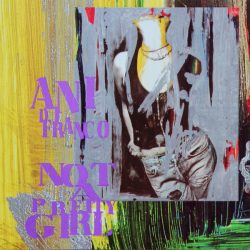 ‘Not A Pretty Girl’ captures an intriguing portrait of songwriter, musician, poet, and political activist Ani DiFranco as a young woman. It was her sixth studio album on Righteous Babe Records, the label she started at age 19 out of her home in Buffalo, New York, and a year before her breakthrough release ‘Dilate.’ By 1995 she had been on the road for about five years, more or less permanently, financing her own tours and selling her albums out of the trunk of her car at gigs. This grassroots approach led to a slowly but inexorably built fan base of mostly female and queer college and high school students, who employed word-of-mouth grassroots promotion and widespread distribution via tape sharing in the early to mid-‘90s.
‘Not A Pretty Girl’ captures an intriguing portrait of songwriter, musician, poet, and political activist Ani DiFranco as a young woman. It was her sixth studio album on Righteous Babe Records, the label she started at age 19 out of her home in Buffalo, New York, and a year before her breakthrough release ‘Dilate.’ By 1995 she had been on the road for about five years, more or less permanently, financing her own tours and selling her albums out of the trunk of her car at gigs. This grassroots approach led to a slowly but inexorably built fan base of mostly female and queer college and high school students, who employed word-of-mouth grassroots promotion and widespread distribution via tape sharing in the early to mid-‘90s.
At this point in her career DiFranco had already made her initial reputation as an iconoclastic punk-influenced folk-rocker but would soon dabble in other genres like funk, jazz, and hip hop. ‘Not A Pretty Girl’ was her last album to feature only her on guitar and vocals and her long-time drummer Andy Stochansky. Her musical trademark is her unusual percussive approach to guitar playing. She can play intricate rapid-fire fingerpicking styles at times and attack other songs with energetic abandon and what seems like violent chaos. Suddenly she stops on a dime to completely change the direction and tempo of a song. She is not afraid of employing alternate guitar tunings, using up to fifty different ones on her songs over the years, or leaping into a jam at the end of a track (‘32 Flavors’). Her vocal meanderings border on classic jazz scat, along with poetry slam recitation, and the flow of rap lyrics. Despite having a multifaceted and sometimes very vulnerable sounding voice, she is the farthest possible thing from a sweet lady folksinger. She does sound as though she drifts off into a dreamy world of her own (‘This Bouquet’) while singing, expressing sheer joy and transcendence. But on songs that sound deceptively laid-back and whimsical, with smooth Shawn Colvin-like vocals, her lyrics are actually as double-edged and biting as those from a Dylan diss track.
Part of the appeal of ‘Not A Pretty Girl’ and other early DiFranco albums was the feeling that DiFranco was singing about her listeners’ own lives, articulating their difficult emotions and experiences. She is unapologetically chatty, confessional, and conversational. On ‘This Bouquet’ she is speechless upon meeting folksinger Greg Brown, feeling too vulnerable and intimidated to initiate a friendship. With poetic imagery she describes an impetuous one-night stand (‘Shy’), regret the morning (or afternoon) after (‘Cradle and All’), wanting an impossibly idealistic list of traits in a partner (‘Asking Too Much’), and facing an unwanted pregnancy (‘Tip Toe’). With breathtaking candour she sings about justified anger (‘32 Flavors’), joy, lust, tumultuous romantic relationships with men and women, betrayal, regret, conflict (‘Hour Follows Hour’), guilt (‘Light of Some Kind,’ ‘Sorry I Am’), and the overwhelming messiness of life as an independent 25-year-old.
The album’s left-leaning political messages target issues such as the death penalty and economic inequality. DiFranco conveys, through the simple inventory of her pockets in the poem ‘Coming Up,’ the struggle to find human connection and survival on the streets of New York City, while thirty-seven floors above her is a very important man in a penthouse suite, making decisions that affect everyone’s lives. Keep in mind that this was over a decade before Occupy Wall Street protests. Her righteous anger builds to a thrashing punk crescendo on ‘The Million You Never Made’, about the major labels that have courted her and other indie artists. She takes aim at the cultural standards of beauty in the blues-inflected title track: “I am not a pretty girl / That is not what I do / I ain’t no damsel in distress / And I don’t need to be rescued / So put me down, punk / Wouldn’t you prefer a maiden fair? / Isn’t there a kitten stuck up a tree somewhere?”
‘Not A Pretty Girl’ is a classic Americana album for many reasons, most of all for being an intelligent record of rigorous self-awareness but thankfully no self-loathing. Being Ani DiFranco in 1995 sounds like a wonderful state of affairs.


